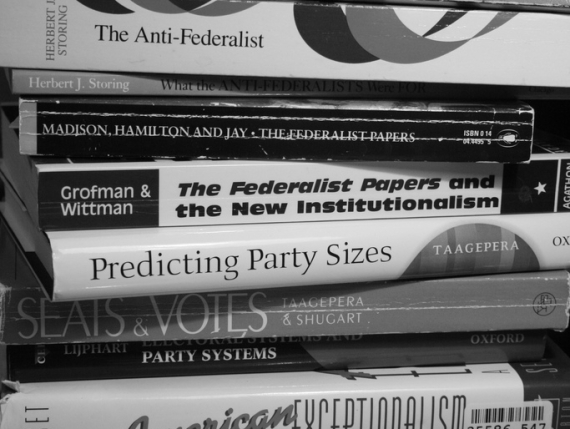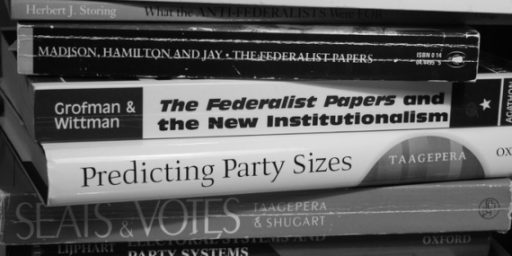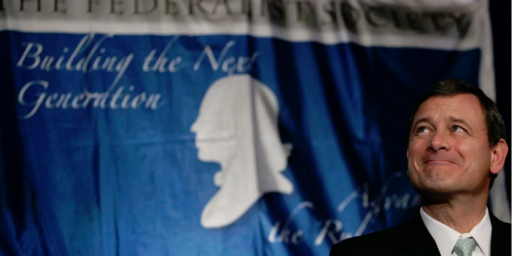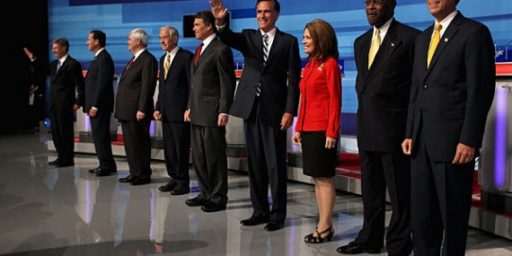What the Framers Meant Part Two: Return of the Federalist Papers
Both the Constitution and the Federalist Papers, impressive as they are, must be understood in terms of not just applied political philosophy, but practical politics as well.
James Joyner steps into a debate between Ezra Klein and the Bruce McQuain over the wisdom of the Framers of the US Constitution regarding the design of the Senate. In that post James rightly notes the following regarding the Federalist Papers, a collection of essays published in New York newspapers to argue for ratification of the constitution:
it’s fair to say that the arguments contained [in the Federalist Papers] were a post hoc rationalization; that is, they defended the compromise document achieved in Philadelphia, not necessarily their ideal system of government.
This point can’t be stressed enough for as impressive as the essays in question are as pieces of applied political philosophy, they have to understood in arguments like this also as persuasive political essays meant to garner support for an already agreed-upon political compromise. In other words, as important as the Papers are as a guide of understanding the thinking of the Framers in regards to the document they produced, they should not be considered as holy writ that provide the definitive answer for all things concerning American institutional theory and practice. They are certainly not the reflection of what Alexander Hamilton, James Madison, and John Jay thought were the most ideal collection of institutions that could have been devised.
Indeed, as I have noted in numerous posts and comments of late, the Constitution as produced was not Madison’s preferred institutional design, but one that included numerous deviations from his proposal (which included, by the way , a Senate apportioned based on state populations and chosen by the House from candidate lists submitted by the states). He ended up arguing quite eloquently for the outcome of the convention in the Federalist Papers because it was his job, so to speak, to do so. Like the Great Compromise* itself, Madison’s arguments in the Federalist Papers were, in part, motivated by practical politics.
I write the above having recently spent a lot of time of late with the Federalist Papers and other writings of James Madison (including Notes on the Debates in the Federal Convention of 1787 Reported by James Madison) as part of a book project that I am working on. And, I would note, that one cannot assume that the Papers reflect pure Madisonian thought, but rather reflect a Madisonian interpretation of the product produced at Philadelphia 1787 which, in fact, deviated in several key ways (including the design of the Senate) from Madison’s preferred vision, which was presented in the Virginia Plan.
____________________________
For further reading:
Carroll, Royce and Matthew Søberg Shugart. 2006. Neo-Madisonian Theory and Latin American Institutions. SSRN. Online here.
Elliot, Jonathan, ed. 1888. Debates of the Adoption of the Federal Constitution. Vol I. New York: Burt Franklin.
Kernell, Samuel, ed. 2003. James Madison: The Theory and Practice of Republican Government. Stanford: Stanford University Press.
Madison, James. 1966. Notes on the Debates in the Federal Convention of 1787 Reported by James Madison. Athens, OH: Ohio University Press.
Meyers, Marvin. 1981. The Mind of the Founder: Sources of the Political Thought of James Madison., revised edition. Hanover, NH: University Press of New England.
*That is, the co-equal representation of the states in the Senate.
Photo: mine.







While I guess I largely agree, which would be no fun to point out, I think there are principles that Madison strongly felt which were retained and remained defensible. I think these were his priorities:
Strong federal government, something promoted by giving small states skin. Once the small states got Senate representation, they supported centralization of power, while the large states only took a half step back.
Balanced government. I’m not sure Madison was that particular about the make-up of the upper chamber; just that it’s composition should be arrived at differently. I think there was more distrust in legislative bodies at the time than usually given.
Virginia be well-represented. I think a case can be made that Virginia was the best governed state and some of the states, like Pennsylvania were virtual basket-cases. I think there is an objective case to be made the new nation would do better under Virginia near-hegomeny, and this goal (obviously achieved) was more than mere political spoils.
While I may be misunderstanding your statement, taken at face value you are incorrect (if you mean that the distrust was held by the Framers). First, consider that under the Article of Confederation the only actual institution of governance was the unicameral Congress. Second, Madison based his Plan around the legislature. In fact, if one looks at the convention debate, the main focus of discussion was the legislature and most of the plans had the legislature picking the executive.
I think the earliest political critiques in the Colonies during the Revolution were of Parliament and not the monarcy, and most would have accepted a compromise in which the colonies remained subject to the monarch, but with their own legislature(s). It strikes me that the organization of the Continental Congress merely reflects that the problem seen at the time was legislative.
Anti-monarchism was a creeping phenomena, thanks to radicals like Paine, but AFAIK only Pennsylvania formed a unicameral legislature. The rest (or most) still felt balanced government was needed, and that an upper chamber to cool the passons was necessary to protect liberty.
I don’t think state-based representation is necessary to be consistent with the Founder’s ideas and concerns. I do think a bi-cameral legislature (largely) is, because I would say the Founders didn’t trust the legislature.
And I’m a bit hazy, but I thought Madison’s Virginia Plan was based upon Jefferson’s ideals for Virginia (or the experiences in their attempt to reform Virginia’s government). And Jefferson believed Virginia’s legislature was despotic and sought to strengthen an upper chamber, exectuve and judiciary against them.
I’m not suggesting that the Founder’s yearned for a quasi-monarchy with a rump legislature, but they wanted balanced government and one of the reasons they spent most of the Convention time on the legislature was because they were most concerned about the power of the legislature.
But, PD, the criticism was not of legislative power, per se, but rather about the fact that the Colonies had no say in said legislature, hence “no taxation without representation.”
And no, bicameralism was not about distrust of the legislature, but rather more a modeling after the bicameral British Parliament as well as adopting certain forms from Rome.
There really is no basis for the claim that the Framers had specific distrust/fear of legislatures.
I would need a bit more clarification on that. I have no recollection linking the Virginia Plan to Jefferson (who was out of the country at the time that Madison drafted the Plan).
Plus, you seem to be separating the upper chamber from the legislature–an upper house is still part of the legislative branch.
I’ve always considered the ultimate result of our governmental design as superior because it included the input of so many people (i.e., a compromise), instead of being the design of any one person.
But that could well be post hoc rationalization on my part.
Somebody in this debate needs to read Federalist #62, where (probably) Madison frankly admits that the Senate was “lesser evil” political deal that can’t really be justified on the basis of theory:
“The equality of representation in the Senate is another point, which, being evidently the result of compromise between the opposite pretensions of the large and the small States, does not call for much discussion. If indeed it be right, that among a people thoroughly incorporated into one nation, every district ought to have a proportional share in the government, and that among independent and sovereign States, bound together by a simple league, the parties, however unequal in size, ought to have an equal share in the common councils, it does not appear to be without some reason that in a compound republic, partaking both of the national and federal character, the government ought to be founded on a mixture of the principles of proportional and equal representation. But it is superfluous to try, by the standard of theory, a part of the Constitution which is allowed on all hands to be the result, not of theory, but “of a spirit of amity, and that mutual deference and concession which the peculiarity of our political situation rendered indispensable.” A common government, with powers equal to its objects, is called for by the voice, and still more loudly by the political situation, of America. A government founded on principles more consonant to the wishes of the larger States, is not likely to be obtained from the smaller States. The only option, then, for the former, lies between the proposed government and a government still more objectionable. Under this alternative, the advice of prudence must be to embrace the lesser evil; and, instead of indulging a fruitless anticipation of the possible mischiefs which may ensue, to contemplate rather the advantageous consequences which may qualify the sacrifice.”
Kernell’s chapter (in his own edited volume, cited above) on Madison’s “flip” in views on these matters during the course of the convention is a wonderful piece. It shows how contadictoray Federalist 10 and 51 are, the former being a theory that required the House of Representatives to be the dominant institution and the federal government to be the dominant layer of government. In 51, by contrast, he is defending a compromise only because he felt it was better than nothing at all. (With the benefit of 200+ years of hindsight, I have to disagree with my favorite political philospher turned practical politician!)
As for the Carroll and Shugart, I had no idea that was still on line. The published version, in Gerardo Munck’s <i>Regimes and Democracy in Latin America, Vol. 1</i> (Oxford 2007), is rather substantially revised, even if the core points about Madison’s theory are pretty much the same,
If Madison had a distrust of legislatures, it was of state legislatures, which he argued were more easily brought under the sway of a “faction” than would be the dominant legislative body of a large federation (for which, as Steven notes, Madison wanted both chambers to represent the states on the basis of their populations).